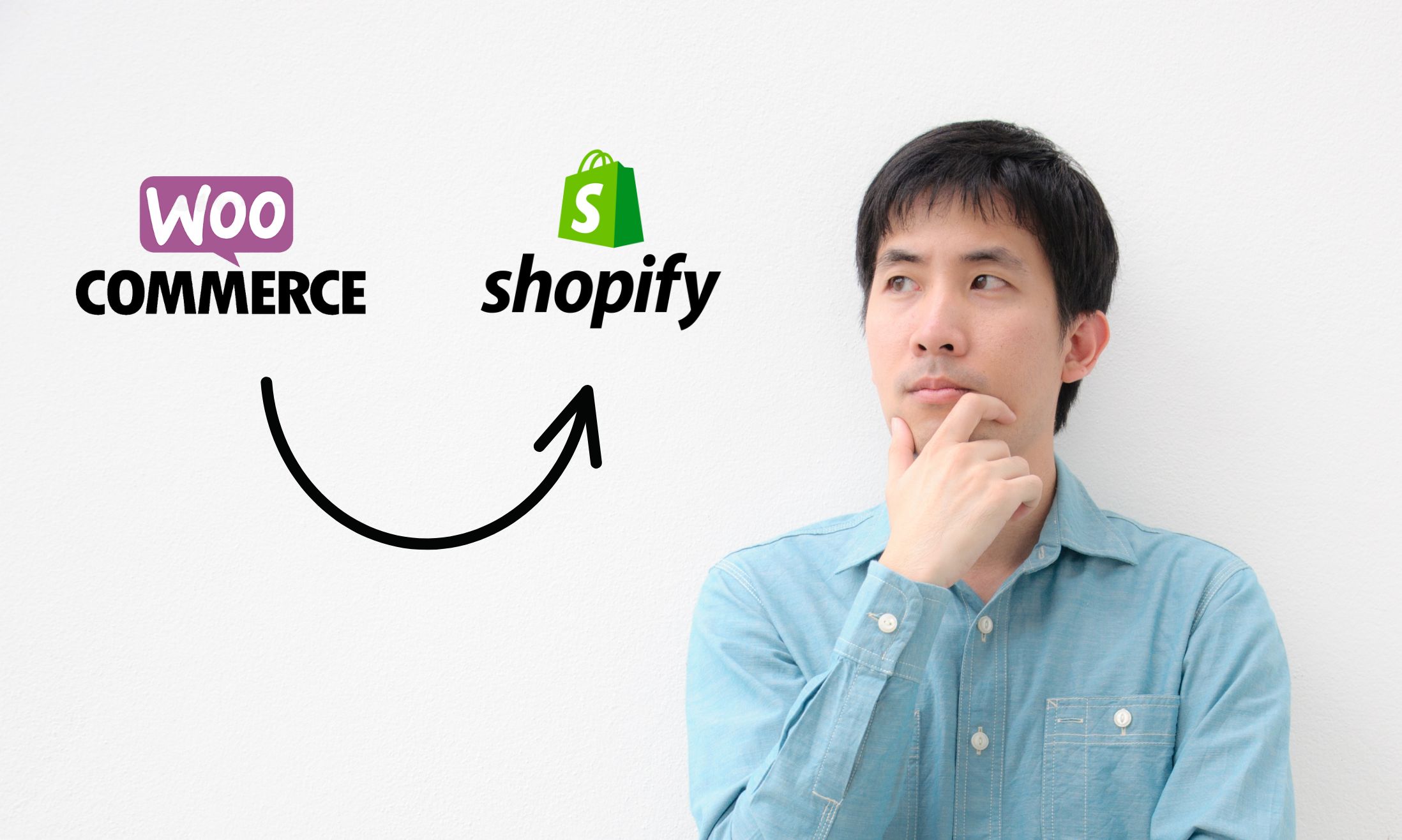As a WooCommerce store owner, you’ve likely poured countless hours and resources into building your online store. But as your business grows, you may be wondering whether WooCommerce is still the best platform for your needs. Perhaps you’ve heard of Shopify and are considering a move, but are hesitant to make the switch. This is a common dilemma for many eCommerce business owners wondering, “Should I move from WooCommerce to Shopify?” In this blog post, we’ll explore the opportunities and challenges of migrating from WooCommerce to Shopify, so you can make an informed decision about whether or not to switch platforms.
Quick Comparison between WooCommerce and Shopify
Before we dive into the reasons to consider a move from WooCommerce to Shopify, let’s take a look at the pros and cons of each platform.
WooCommerce Pros:
- Flexibility: WooCommerce is an open-source plugin, which means that you have complete control over your store’s code and customization options.
- Affordability: WooCommerce is free to use, although you’ll need to pay for hosting and other add-ons.
- SEO: WooCommerce is built with SEO in mind, which can help your store rank higher in search engine results.
- Community: WooCommerce has a large community of developers and users who can offer support and advice.
WooCommerce Cons:
- Scalability: As your store grows, WooCommerce may struggle to handle the increased traffic and data.
- Security: As an open-source plugin, WooCommerce can be more vulnerable to security breaches.
- Updates: Keeping your store up-to-date with the latest version of WooCommerce and all of its plugins can be time-consuming and potentially risky.
- Support: While there is a large community of WooCommerce users, support is primarily community-based, which can be frustrating if you need immediate assistance.
Shopify Pros:
- User-friendliness: Shopify is known for its ease of use, with a drag-and-drop interface that makes it easy to set up and manage your store.
- Reliability: Shopify is a standalone platform that is designed specifically for eCommerce, so you can expect high levels of reliability and uptime.
- Performance: Shopify is optimized for speed and performance, which can help to improve your store’s user experience.
- Support: Shopify offers 24/7 customer support via phone, email, and live chat.
Shopify Cons:
- Pricing: While Shopify offers a 14-day free trial, after that you’ll need to pay a monthly fee ($25-$65-$399-$2,000/month). There are also transaction fees if you use a payment gateway other than Shopify Payments.
- Customization: While Shopify offers a range of themes and apps to customize your store, you may have limited control over the code and functionality.
5 Reasons to consider moving from WooCommerce to Shopify

While WooCommerce is a powerful and flexible platform, there are several reasons why you may want to consider a move to Shopify:
1. User-friendliness
First and foremost, Shopify’s user-friendliness sets it apart from WooCommerce. Shopify has a simple, intuitive drag-and-drop interface that makes it easy for even the most inexperienced users to set up and manage an online store. In contrast, WooCommerce is a plugin for WordPress, which means that it requires some technical knowledge to set up and customize, which can be intimidating for users without coding experience.
2. Reliability and Performance
Another significant advantage of Shopify over WooCommerce is its reliability and performance. Since Shopify is a standalone eCommerce platform, it is designed specifically for eCommerce and optimized for speed and performance. This means that your store will load faster, and your customers will have a better user experience overall. Additionally, Shopify offers reliable hosting, with a 99.99% uptime guarantee, which means that your store will be available to your customers 24/7.
3. Support
Shopify’s customer support is another significant advantage for store owners. Shopify offers 24/7 customer support via phone, email, and live chat. This means that if you run into any issues with your store, you can quickly get in touch with a Shopify expert who can help you resolve the issue. In contrast, while WooCommerce has a large community of developers and users who can offer support and advice, support is primarily community-based, which can be frustrating if you need immediate assistance.
4. App Store
Shopify’s app store is another compelling reason to consider a move. The app store offers a range of plugins and apps that can be used to enhance your store’s functionality. The app store is curated by Shopify, which means that you can trust that the apps are reliable and secure. In contrast, while WooCommerce has a large number of plugins available, there is no official WooCommerce app store, which means that the quality of the plugins can vary.
5. Payment Gateway
Finally, Shopify’s payment gateway, Shopify Payments, is an integrated payment gateway that allows you to accept credit card payments without needing to set up a separate payment processor. Shopify Payments offers competitive rates and is easy to set up, making it a popular choice for many store owners. In contrast, while WooCommerce offers a range of payment gateway options, setting up a payment gateway can be more complex and may require technical knowledge.
4 Reasons to stay with WooCommerce

While Shopify offers many benefits, WooCommerce still has its strengths that can make it a viable option for some eCommerce business owners. Here are some reasons why you may want to stay with WooCommerce:
1. Flexibility
One of the biggest advantages of WooCommerce is its flexibility. As an open-source plugin, you have complete control over your store’s code and customization options. This means you can create a truly unique and personalized online store that fits your specific needs. With WooCommerce, you can choose from a wide range of plugins and themes, and you have the freedom to customize them to your liking. This flexibility is particularly beneficial for businesses that require specialized features or functionality.
2. Affordability
Another advantage of WooCommerce is its affordability. While Shopify offers a range of pricing plans, WooCommerce is free to use. However, keep in mind that you’ll need to pay for hosting, domain name, and other add-ons. But compared to Shopify, this can make it a more cost-effective option for businesses that are just starting out or have a limited budget.
3. SEO
WooCommerce is built with SEO in mind, which means it offers features and functionality that can help improve your store’s search engine rankings. For example, WooCommerce allows you to optimize your product pages for SEO, use keyword-rich URLs, and add meta descriptions and tags. Additionally, WooCommerce integrates with popular SEO plugins like Yoast SEO, which can further enhance your store’s SEO.
4. Community
WooCommerce has a large community of developers and users who can offer support and advice. This community can be a great resource if you encounter any issues with your store or need help customizing it. You can find helpful advice on the WooCommerce support forum, as well as connect with other users through social media and online communities. This community is also responsible for creating a wide range of plugins and themes that you can use to enhance your store’s functionality and design.
Opportunities and Challenges when migrating from WooCommerce to Shopify
If you’re considering migrating from WooCommerce to Shopify, it’s important to weigh the potential opportunities and challenges you may face. While Shopify offers several advantages, there are also some obstacles that you’ll need to overcome. Here are some additional details about the opportunities and challenges:
Opportunities:
- Improved Design & User Experience: Shopify is optimized for speed and performance, which can improve your store’s user experience. Additionally, Shopify’s drag-and-drop interface makes it easy to create a visually appealing store that is easy to navigate.
- Access to a Large App Store: Shopify has an extensive app store that offers a range of plugins and apps that can be used to enhance your store’s functionality. This can help you add features to your store that were not available on WooCommerce.
- Easier Payment Processing: Shopify offers Shopify Payments, which is an integrated payment gateway that allows you to accept credit card payments without needing to set up a separate payment processor. This can simplify your payment processing and make it easier for customers to check out.
- 24/7 Customer Support: Shopify offers 24/7 customer support via phone, email, and live chat. This means that if you encounter any issues with your store, you can quickly get in touch with a Shopify expert who can help you resolve the issue.
Challenges:
- Data Migration: Migrating from WooCommerce to Shopify requires you to transfer all of your store’s data, including product information, customer data, and order history. This can be a complex process that requires technical knowledge and can take time to complete.
- Customization: While Shopify offers a range of customization options, it may not offer the same level of flexibility as WooCommerce. This means that if you have a highly customized store, you may need to make some compromises when migrating to Shopify.
- Learning Curve: Moving to a new platform always requires a learning curve, even if the new platform is more user-friendly than your previous one. You’ll need to familiarize yourself with Shopify’s interface, app store, and payment processing system. This can take time and require some trial and error before you feel comfortable and confident using the new platform.
How to Overcome Challenges If You Move from WooCommerce to Shopify
Migrating from WooCommerce to Shopify can be a complex process that requires technical knowledge and careful planning. To overcome these challenges, it’s important to partner with a reliable and professional platform migration service provider like Tigren.
Tigren is an experienced eCommerce development company that offers expert WooCommerce to Shopify migration service. With over 10 years of expertise in developing and migrating online stores, our team of experienced developers has a deep understanding of both platforms and can seamlessly transfer your store to Shopify.
Our migration process includes the following steps:
- Analyzing your current store: We’ll analyze your current store to understand its structure, content, and data.
- Preparing the migration plan: Based on the analysis, we’ll prepare a comprehensive migration plan that outlines the steps involved in migrating your store to Shopify.
- Data migration: We’ll transfer all of your store’s data, including product information, customer data, and order history, to Shopify.
- Store setup: We’ll set up your store on Shopify, including configuring your payment processing, shipping options, and other store settings.
- Testing: We’ll thoroughly test your new store to ensure that everything is working correctly and that your data has been transferred accurately.
- Launching your new store: Once everything has been tested and approved, we’ll launch your new store and make it live.
Partnering with Tigren can help you overcome the challenges of migrating from WooCommerce to Shopify. Our experienced developers can ensure that your migration is seamless and that your new store is set up correctly.
Final Words
The decision of whether or not to move from WooCommerce to Shopify ultimately depends on your specific business needs and goals. Consider factors such as scalability, user-friendliness, customization, and cost when making your decision.
Migrating from WooCommerce to Shopify can be a complex process, but it can also offer many benefits. Shopify is a user-friendly, reliable, and performance-optimized eCommerce platform that can help you improve your store’s user experience and increase your sales. So, if you’re asking yourself “Should I move from WooCommerce to Shopify?”, it’s worth exploring the possibilities.
If you do decide to make the switch, partnering with a professional platform migration provider like Tigren can help you overcome the challenges of data migration, customization, and the learning curve. With our experience in developing and migrating online stores, we can ensure that your migration is seamless and that your new store is set up correctly.
In the end, whether you choose to stick with WooCommerce or make the move to Shopify, remember that your eCommerce platform is a crucial element in your online business success. Take the time to weigh your options and make the best decision for your business.

